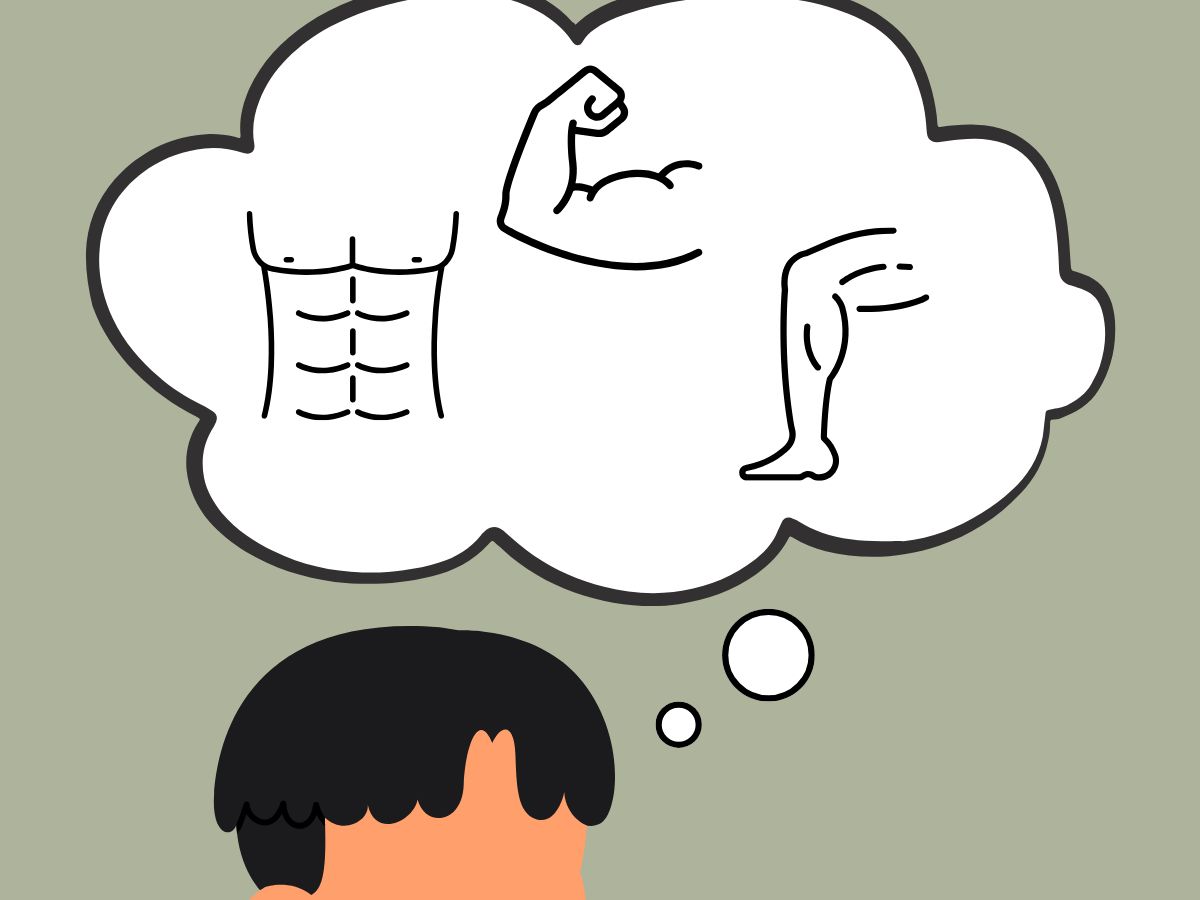“Winter arc” this, “gym-bro” that, many influencers tell young boys to “start the cut” early. They plague the easily influenced minds of teenage boys.
Many examples appear in television shows, movies, social media, and the music we listen to. The media has always played into the negative ideology towards masculinity, but why?
Social media is an example of this trend. Everyone uses TikTok, Instagram, or Snapchat every day. Most people get on their phones to check their feeds first thing in the morning after they get up. So of course, this frequent use leads to younger users being easily distracted and persuaded by the influencers they watch online.
You will find many social media personalities, such as Andrew Tate or Kevin Samuels, successfully convincing their audience that they aren’t “manly” or tough enough. Then they give them a step-by-step tutorial on how to torture themselves for the sake of being accepted by society.
But these teenage boys have got to put that pre-workout powder down. Most protein powders contain high amounts of caffeine, which is extremely harmful to a teen’s body. These powders can increase the risk of kidney and liver failure.
Unfortunately, this is not the only harmful effect of a chronic gym obsession.
According to TheBlackandWhite.net, “While fitness culture promotes discipline, motivation and muscular development, the extreme physical and mental damage of such a culture overshadows the positive aspects. Focusing on purely physical goals and ignoring one’s external and internal health leads to obsessive practices.”
If executed incorrectly, this “self-discipline” can deteriorate your mental well-being. Focusing too much on calorie intake can lead to forcing yourself to eat less than what you need or binge, both of which are physically and mentally damaging.
According to EverydayHealth.com, “Toxic masculinity is linked to increased pressures to physically embody the ideals of strength and power, which can contribute to male body image issues in men.”
For as long as anyone can remember, men have been given the belief that if they are not strong or tough enough then they do not have any value and cannot call themselves a man.
Everyday Health says, “Expectations like these are part of what’s known as ‘toxic masculinity,’ a widespread societal and cultural view that asserts that “manliness” is achieved through toughness, power, aggressiveness, antifemininity, and little to no emotion — and that not meeting these ideals is weak or unmanly.”
There is an unhealthy and toxic stigma —which is deeply rooted in traditional male roles, homophobia, and misogyny— around masculinity and what is defined as “manliness” that can confuse many young teen boys who idolize Instagram fitness influencers.
While the “gym bro” community is toxic, there are still many people out there who advocate for a healthy lifestyle. However, younger audiences should still be careful of who they follow, and influencers should be mindful of what they post.







sid • Dec 17, 2024 at 9:18 pm
I agree with the message you are trying to send, at times, the gym community can be very toxic, and this sphere is often not the most healthy environment. I agree with your messages about toxic masculinity, obsessive practices, and the vanity of aligning your goals with a certain ideal body. However, there is a lot of misinformation within your article that could’ve been avoided with enough research and better wording!
almost all protein powders do not contain caffeine. however, preworkouts do. no science has linked protein powders or high protein intake with risk of kidney or liver failure. I feel as though this spreads misinformation and fear mongering within a product that a lot of people may use to supplement for their goals in any sport, or even for lifestyle purposes, or any deficiencies in their diet.
in my opinion, the usage of the word ‘torture’ for simply demonstrating a workout routine/exercise is unnecessary and again spreads fear to a very innocent and simple practice because in reality, its demonstrating how to perform an exercise properly to make sure you use proper form and don’t hurt yourself , and also so that you do it right to align with your goals.
also, focusing on calorie intake can be very important for those who are struggling with lifestyle/health issues, if your body weight is severely impacting your lifestyle, it could be necessary to lose/gain some weight and calorie counting is an extremely efficient way to do this! I feel as though we shouldn’t demonize this, the problem arises when it becomes obsessive!
you also fail to recognize that working out is not solely for aesthetic purposes. a lot of people work out for a sport, strength building, lifestyle purposes, to feel better, and tons of other benefits.
I feel as though this article has a very black and white view of the gym community and paints it as a horrible thing and this could push people away from entering this community/hobby. I do appreciate the last paragraph but it simply doesn’t compensate for everything else that has been said. i think you could have highlighted some positive influencers within the community as well, and the benefits of the lifestyle.
I hope what I am saying is not coming across as harsh because that isnt my intention. the article is really well written, and I love the hook and your style of writing. your message still is valid and I almost agree with your opinion as well. Its just that some of your claims aren’t true.
Evan Flores • Dec 12, 2024 at 11:58 am
This article was very informative as it has informed me.
Evan Greenhalgh • Dec 6, 2024 at 10:00 am
Based
Ethan Le • Dec 5, 2024 at 5:50 pm
This article isn’t entirely correct.
First of all, you only mention the influencers Andrew Tate and Kevin Samuels, who are negative influences, and how they “give men the belief that if they’re not fit enough they can’t call themselves a man”. However, you don’t mention influencers that have a positive influence such as Noel Deyzel and Jeff Nippard. They literally give you uplifting (and sometimes funny) advice and tutorials on how you can get healthy.
You also mention that gym influencers “give them tutorials on how to torture themselves for the sake of being accepted by society”. No, this statement is incorrect, unless you’re doing something incorrectly like for example in your technique or way too much volume for a workout, this is not considered “torture”.
According to “Healthline”, “In turn, this can result in structural damage to the muscles. Mechanical damage to muscle proteins stimulates a repair response in the body. The damaged fibers in muscle proteins result in an increase in muscle size.” This quote DOES mention “structural damage to the muscles”, but this “damage” is only tiny microtears in the muscle fibers, which isn’t a big deal. If executed correctly with proper technique, discipline, rest, and nutrition (This is why we eat foods such as chicken), your muscles will grow and adapt to the resistance caused by working out.
You also mentioned “for the sake of being accepted by society.” However, this is not the case. According to a video posted by “Noel Deyzel”, he responds to a hate video against gymgoers and explains that people go to the gym for their own satisfaction and goals, not for the satisfaction of others.
You also mention that fitness culture/working out results in extreme physical and mental damage to the participant, this is also wrong.
According to studies conducted by “Psychology Today: The Mental Health Benefits of Strength Training”, the start of the article states “Their findings showed clearly that consistent resistance training, whether heavy or light, anywhere from two to five days per week, helped men and women, young and old alike, to stave off depression and decrease its symptoms. Additionally, weight training was reported to make participants feel immediately better after completing a workout.” Working out helps you let go of stress and also interact with other gymgoers in the gym or wherever your fitness center is. Going to the gym/whatever fitness center you go to is already one level of confidence, however, interactions with others in the gym will build up your confidence and will be useful to you in the future. Examples can be school, work, hangouts, etc.
Why do you mention teenage boys taking pre-workouts? Do you have a source for this? Teenagers between the ages of 14-18 are still growing and are eating nutritious foods that support their workouts, NOT PRE-WORKOUT.
Finally, if working out, going to the gym, or doing any type of exercise/sports in general, didn’t exist, what are we supposed to do with our lives? Doom scroll on our phones? Eat junk food all day? Sit on the couch or bed and watch movies/shows all day?
In summary, this article isn’t entirely correct, however, there are some parts such as the third to last paragraph that mention toxic masculinity, that I can agree with. But, in the end, doing what is best for you to maintain a healthy lifestyle is good for you, if you’re doing it CORRECTLY.
Veda Vasista Panjala • Dec 5, 2024 at 2:21 pm
While the paper raises valid concerns about toxic masculinity and the pressures of fitness culture, it risks oversimplifying the “gym bro” community and overlooking the nuances of fitness as a positive outlet. Many individuals in this space advocate for mental health, self-confidence, and balanced lifestyles rather than toxic behaviors. The generalization that fitness influencers primarily encourage harmful habits or unrealistic ideals could unfairly discredit their positive impact on encouraging healthier choices for some followers. Additionally, while the critique of protein powders and supplements highlights valid health risks, it overlooks the potential benefits of these products when used responsibly. The argument would benefit from a more balanced perspective that acknowledges both the positive and negative aspects of gym culture. Winter arc=👍👍👍👍👍👍👍👍👍
Ethan Le • Dec 5, 2024 at 5:51 pm
based
Ethan Le • Dec 6, 2024 at 8:20 am
based!11!!!1111!!!!!
Anirudh Garre • Dec 6, 2024 at 1:29 pm
Real those who know 💀💀💀
isa • Dec 5, 2024 at 12:23 pm
this is so real, don’t let them silence you pooks
sid • Dec 17, 2024 at 9:19 pm
I don’t think the comments are trying to silence her, its just valid criticism!